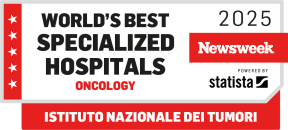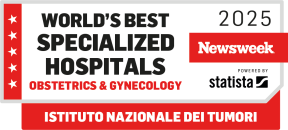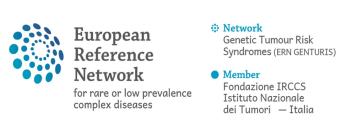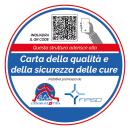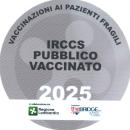Ongoing Projects
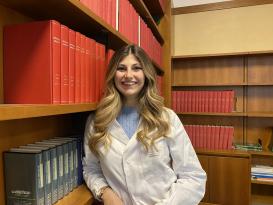
Claudia Aurelio
Unit: Molecular Pharmacology
Director of studies: Dr. Patrizia Gasparini
Supervisors: Dr. Claudia Chiodoni, Dr. Dario Sangiolo
Targeting B7-H3 for Novel CAR-CIK Approaches in Pediatric Soft Tissue Sarcomas
Soft tissue sarcomas (STS) are rare malignancies of mesenchymal origin and account for approximately 12% of all pediatric cancers. Their management remains particularly challenging in high-grade, refractory, or relapsed disease, where therapeutic options are limited. Although Chimeric Antigen Receptor (CAR)-based immunotherapy has revolutionized the management of hematological malignancies, its potential to pediatric sarcomas is still largely unexplored. B7-H3, a surface molecule highly expressed across multiple pediatric sarcoma subtypes, has emerged as a promising target for novel immunotherapeutic strategies. This PhD project investigates the antitumor efficacy of B7-H3–redirected cytokine-induced killer (CAR-CIK) cells, which pair engineered antigen specificity with intrinsic, HLA-independent cytotoxicity. The study will assess CAR-CIK activity against rhabdomyosarcoma, desmoplastic small round cell tumor, synovial sarcoma, and epithelioid sarcoma using preclinical in-vitro and in-vivo models. The overarching goal is to generate translational evidence supporting the development of novel CAR-CIK–based strategies for the treatment of pediatric solid tumors.
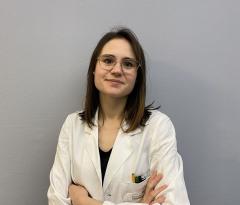
Alessia Beretta
Unit: Molecular Pharmacology
Director of Studies: Dr. Nadia Zaffaroni
Supervisors: Dr. Paola Perego
Genomic Characterization and Preclinical Model Development to Expand the Therapeutic Options for Epithelioid Hemangioendothelioma
Epithelioid hemangioendothelioma (EHE) is an ultra-rare, translocated vascular sarcoma characterized by a heterogeneous and not predictable clinical behavior. No standard treatments are available and the response to conventional chemotherapy is extremely poor. This PhD project is part of a more extended project aimed at performing a genomic, epigenetic and proteomic characterization of prospectively collected EHE samples to identify novel biomarkers and new therapeutic targets. More specifically, the project focuses on the generation of EHE translatable models to use for molecularly characterizing this poorly understood disease and for validating novel therapeutic targets, putative biomarkers and determinants of drug resistance.
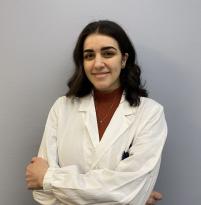
Giancarla Bernardo
Unit: Microenvironment and Biomarkers of Solid Tumors
Director of Studies: Dr. Lucia Sfondrini
Supervisors: Dr. Elena Jachetti
Targeting tumor-associated microbiota: a new strategy to hit tumor cells
Emerging evidence has revealed that several organs and tissues once considered sterile, as lung and breast, harbor a unique microbiota. Recently, it has been reported that the tumor modifies the local microbial composition as compared to the healthy tissue, and that tumor-associated microbiota is involved in many pro-tumoral functions. In my PhD project, I am studying the impact of pulmonary microbiota on the growth of different murine model metastases, focusing on its effect on local immunosuppression. Moreover, I will analyze the microbial composition of human lung and breast tumor tissues to evaluate whether it correlates with the patient clinical outcome.

Michela Bianchi
Unit: Research in Nutrition and Metabolomics
Director of Studies: Dr. Patrizia Pasanisi
Supervisors: Dr. Claudia Chiodoni
Metabolomics and penetrance of BRCA genes: role of circulating microbiota metabolites as disease modulators in women with BRCA1/2 mutation
Women with BRCA1/2 mutations face a high risk of breast (55%) and ovarian cancer (16–59%), but not all carriers develop cancer, suggesting environmental factors like diet and microbiota may modulate this risk. The gut microbiota ferments dietary fiber into short-chain fatty acids (SCFAs), which have anti-inflammatory and anti-tumor effects, while high-fat diets can increase harmful lipopolysaccharides (LPS) linked to inflammation and cancer progression. This project aims to investigate the role of circulating microbiota metabolites (SCFAs) and dysbiosis biomarkers (LPS/LBP) as modulators of cancer risk in BRCA mutation carriers. It focuses on a cohort of 416 BRCA mutation carriers from the COS 2 study, who have completed a Mediterranean dietary intervention trial.
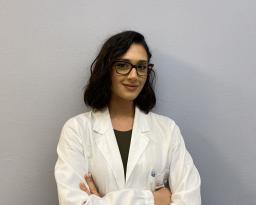
Clorinda Brignola
Unit: Hereditary Digestive Tract Tumors
Director of Studies: Dr. Marco Vitellaro
Supervisors: Dr. Manuela Gariboldi
Improving the Identification of Hereditary Gastrointestinal Cancer: Paving Stones on the Road towards Personalized Precision Medicine
2-5% of gastrointestinal tumors are due to the presence of an hereditary predisposition mostly related to the presence of a constitutional pathogenic variant in a cancer predisposition gene. For some variants known as variants of unknown significance (VUS), it’s difficult to establish a clinical significance related with the risk of cancer occurence. In my PhD project I will focus on the reassessment of VUS identified in genes of hereditary predisposition to digestive tract tumors and their reclassification through in silico analysis, segregation studies and functional studies to better improve personalized surveillance and risk reduction measures.

Eleonora Citeroni
Unit: Integrated Biology of Rare Tumors
Director of Studies: Dr. Antonella Tomassetti
Supervisors: Dr. Marina Bagnoli
Exploring the involvement of choline kinase enzyme in ovarian cancer progression and dissemination
Epithelial Ovarian Cancer (EOC) is the deadliest gynecological cancer, with 70% being High-Grade Serous Ovarian Carcinomas (HGSOCs), which are highly heterogeneous and resistant to existing therapies. EOC cells show high levels of phospho-choline (PCho) and total choline compounds, due to the over-expression of Choline kinase alpha enzyme (ChoK-α). ChoK-α is the first enzyme of Kennedy pathway and catalyses the conversion of free choline in PCho, both a precursor and a breakdown product of phosphatidylcholine (PtdCho), a major component of cellular membrane. Our group previously showed that ChoK-α silencing reduces PCho intracellular content and OC cells aggressiveness, suggesting ChoK-α as a promising target. In my PhD project, I will explore ChoK-α's role in OC progression. By comparing CHKA silencing with a selective, first-in-class ATP-mimetic ChoK-α inhibitor, I aim to assess whether inhibiting ChoK-α's catalytic activity is key to induce disease regression.
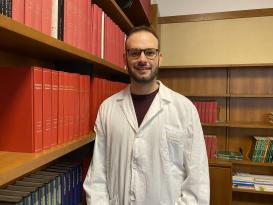
Michele De Luca
Unit: Integrated Biology of Rare Tumors
Director of studies: Elena Jachetti
Supervisors: Dr. Delia Mezzanzanica, Dr. Gustavo Baldassarre (CRO Aviano)
Immune system contribution in overcoming therapeutic resistance in ovarian cancer
High Grade Serous Ovarian Cancer (HGSOC) is the most lethal gynecological malignancy, characterized by TP53 mutations and defects in DNA repair. Standard treatment includes debulking surgery, platinum (PT)-based chemotherapy and PARP inhibitors, although mechanisms of resistance remains a major clinical challenge. The G9a/GLP histone methyltransferase, which is overexpressed in HGSOC, supports DNA repair and modulates the tumor immune microenvironment. My PhD project investigates a novel therapeutic approach combining chemotherapy with the inhibition of G9a, using syngeneic models injected with therapy-resistant and sensitive ID8 ovarian cancer cells. I hypothesize that this combination enhances antitumor immunity by promoting a more pro-inflammatory tumor microenvironment that activates an immune response against this cancer. As effective therapies for HGSOC remain a critical unmet need, the ultimate goal of this work is to identify key signaling pathways and therapeutic strategies capable of overcoming current treatment barriers and improving therapeutic efficacy, thereby contributing to more effective and personalized options for HGSOC patients.
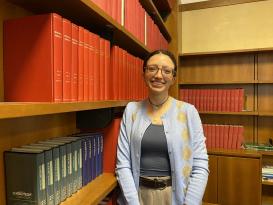
Benedetta Dionisi Ferrera
Unit: Data Science
Director of Studies: Dr. Tiziana Rancati
Supervisors: Dr. Maria Carmen De Santis, Dr. Wouter AC van Amsterdam
Casual interence models for the prediction of radio-induced toxicity after breast cancer radiotherapy
Radiotherapy planning and advanced delivery techniques allow targeting the breast while minimising the dose to organ at risk. However, some doses unavoidably reach healthy tissues and organs, potentially causing damage and leading to what we refer to as radio-induced side effects. The risk of developing side effects varies substantially across individuals, reflecting its multifactorial origin. In this framework, causal inference models allow a deeper understanding of the mechanisms underlying the observed phenomena, identifying the causal pathways that lead to undesired effects to normal tissue. The primary aim of this PhD project is to predict the risk of side effects after breast cancer radiotherapy under different hypothetical dose distributions to organs at risk. To achieve this, the goal is to reconstruct the most comprehensive representation of the causal relationships between radiation dose and patient-specific characteristics, identifying the factors that contribute to normal-tissue functional damage.
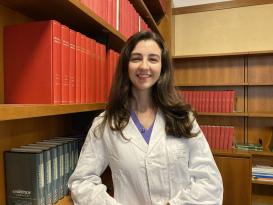
Chiara Dossena
Unit: Integrated Biology of Rare Tumors
Director of studies: Dr. Loris De Cecco
Supervisors: Dr. Veronica Biassoni, Dr. Patrizia Gasparini
Deciphering tumor DNA methylation profiles in liquid biopsies to improve diagnosis and to monitor the course of the disease in pediatric central nervous system tumors
Pediatric central nervous system tumors are the leading cause of death in children and adolescents, and their diagnosis often requires invasive surgical procedures. Although tissue specimens are the gold standard for discovering the biological alterations of tumors, their collection is invasive and provides only a single space-time snapshot of the disease. Liquid biopsies, such as blood, cerebrospinal fluid, and urine, represent a non-invasive and easily accessible alternative. They can be a source of tumor genetic material useful for diagnosis, monitoring treatment response, and predicting disease progression. In recent years, some classifiers have been developed that associate the methylation profile of tumor DNA with a specific tumor type according to the 2021 WHO classification of brain tumors. However, the classification result is uncertain in about 33% of cases, possibly due to intratumoral heterogeneity. Therefore, my PhD project will focus on exploiting the methylation profile of circulating tumor DNA to classify and monitor pediatric brain tumors, and on studying intratumoral heterogeneity at the single-cell level in cases where it prevents a definitive classification.
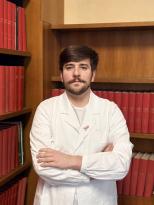
Matteo Ferrario
Unit: Molecular immunology
Director of studies: Dr. Daniele Lecis
Supervisors: Dr. Claudia Chiodoni
Role of JMJD6 in the regulation of tumour-intrinsic and microenvironment related features of hormone positive breast cancer
Estrogen receptor positive breast cancers (ERα+ BCs) treatments are often hampered by the development of therapy resistance. Epigenetic modifications, either in cancer cells or in the immune cells that infiltrate the tumour, can alter therapeutic responses. JMJD6 is an epigenetic regulator whose upregulation is associated with poorer prognosis in patients with ERα+ BCs, potentially because it affects responses to treatment. In my PhD project, I aim to investigate how JMJD6 influences the response to hormonal therapies in both human and mouse models. In addition, I will examine how JMJD6 shapes the phenotype of macrophages, a key population of immune cells that infiltrate breast cancer tumours abundanly.

Patrizia Ghidotti
Unit: Epigenomics and Biomarkers of Solid Tumors
Director of Studies: Dr. Orazio Fortunato
Supervisors: Dr. Elena Jachetti
Immunoregulatory role of Extracellular Vesicles in advanced Non Small Cell Lung Cancer
Immune-checkpoint inhibitors (ICIs) have improved clinical outcomes of patients with advanced Non-Small Cell Lung Cancer (NSCLC). Tumor PD-L1 remains the only clinical predictor biomarker of response to ICIs. Despite the efficacy of ICIs mainly correlates to high PD-L1 expression, also patients with low PD-L1 can benefit from ICIs. Extracellular vesicles (EVs) are membrane-limited particles described as biomarkers and immune mediators in cancer. In my project, I mean to evaluate plasma EVs of advanced low PD-L1 NSCLC patients in order to find biomarkers for combination therapy (chemotherapy plus ICIs) and to investigate their role as regulator of the anti-tumor immune response.
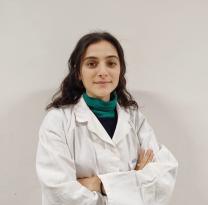
Giulia Guerra
Unit: Epidemiology and Prevention
Director of Studies: Dr. Elisabetta Venturelli
Supervisors: Dr. Veronica Huber
Application of a liquid chromatography–high resolution mass spectrometry metabolomics
Untargeted metabolomics analysis has emerged as a novel platform for studying cancer, enabling the detection of numerous metabolites to uncover mechanisms of cancer development and progression. However, standardizing and harmonizing data across diverse sources remains a challenge, complicating large-scale studies. Effective analytical design, including robust sample preparation and pre-analytical evaluations, is crucial for ensuring reproducibility, especially in studies involving thousands of samples. My PhD project aims to establish a robust pipeline for HPLC-HRMS-based metabolomics tailored to cancer epidemiology. This involves optimizing sample preparation, refining analytical conditions, and developing stringent quality control protocols to ensure reproducible detection of different metabolite classes, enabling accurate and comprehensive metabolic profiling in prospective studies.
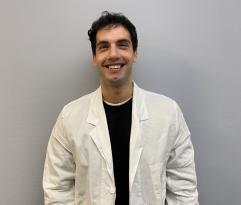
Luca Lalli
Unit: Translational Immunology
Director of Studies: Dr. Rosalba Miceli
Supervisors: Dr. Licia Rivoltini, Dr. Diego Tosi (Institut du Cancer de Montpellier)
Supervised and unsupervised pattern recognition analysis of immunological parameters in clinical setting
My project aims to improve the analysis of the huge and complex amount of immunological data obtained with high-throughput flow cytometry. I am developing deep machine learning methods, exploiting unsupervised clustering, to achieve fast and robust analysis by eliminating operator dependency. The main goal is to offer solutions for standardized manipulation of heterogeneous data, ensuring accurate comparisons between samples and simplifying the analysis workflow to save time and effort. This approach leads to a comprehensive understanding of the human immune response and allows the discovery of rare clusters and unknown patterns of immunological data. The expected result is improved clinical work-up due to an integrated, operator-independent analysis workflow.
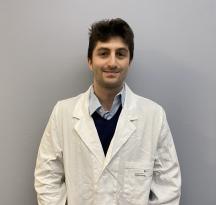
Armando Licata
Unit: Integrated Biology of Rare Tumors
Director of Studies: Dr. Loris De Cecco
Supervisors: Dr. Lucia Sfondrini, Dr. Gabriella Sozzi
The role of microbiota in carcinogenesis and tumor progression in SSC
The role of the microbiome in cancer has gained recognition in recent years. In this project, my objective is to elucidate the microbiome's involvement in Squamous Cell Carcinoma (SCC). This project will use advanced sequencing and bioinformatics techniques to conduct a comprehensive exploration of the microbiome's relationship with SCC, focusing specifically on Lung Squamous Cell Carcinoma (LUSC) and Oral Squamous Cell Carcinoma (OSCC). Through ecological analyses, gene expression profiling, and cytokine assessments, I aim to establish the link between the composition of the microbiota and the progression of SCC. To accomplish this, I will employ a diverse set of omics approaches, including metagenomics, RNA-seq, and miRNA-seq, to delve deep into the microbial factors contributing to the development of SCC. The outcomes of this research have the potential to significantly enhance our understanding of SCC and inform the development of more precise and effective strategies for managing this type of cancer.
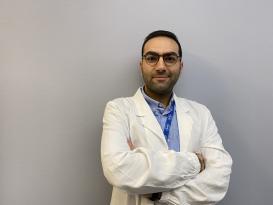
Arman Mandegar Khorasani
Unit: Molecular Immunology
Director of Studies: Dr. Sabina Sangaletti
Supervisors: Dr. Arsela Prelaj
Bone Marrow Mesenchymal Cell as sensor of early relapse in lung cancer
Despite advances in cancer treatments like targeted and immune therapies, lung cancer patients still face the lowest five-year survival rates. Improving survival outcomes, particularly through early detection of relapse or early-stage disease, is crucial. My PhD project aims to identify early relapse biomarkers by investigating the biological mechanisms driving relapse. Tumor development creates a continuous hematopoietic demand, primarily sensed by bone marrow mesenchymal stem cells (BM-MSCs), which then redirect hematopoietic stem cell (HSC) differentiation toward tumor-supporting immune populations. This "BM sensing" mechanism may occur early, preceding malignant transformation, and be marked by a peripheral enrichment of specific myeloid cell subsets cells.

Beatrice Mazzoleni
Unit: Integrated Biology of Rare Tumors
Director of Studies: Dr. Angela Greco
Supervisors: Dr. Maria Grazia Borrello
Role of autophagy in therapy-induced senescence in thyroid cancer
Anaplastic thyroid cancer (ATC) is among the deadliest solid tumors, for which no effective treatments are currently available. Several anti-cancer treatments induce senescence (therapy-induced senescence, TIS); unfortunately, TIS cells can fuel many aspects of cancer progression. With my project I aim to understand the role of TIS in ATC, and its interplay with autophagy, a catabolic process which is also often induced by anti-cancer treatments. The project might provide new insights into TIS cells biology, and unveil the possibility to target them by modulating the autophagic process.
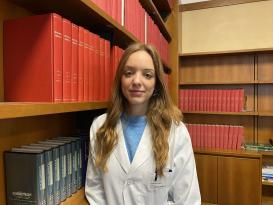
Eleonora Muraro
Unit: Integrated Biology of Rare Tumors
Director of studies: Dr. Angela Greco
Supervisors: Dr. Mara Mazzoni
Role of innervation in thyroid cancer and modulation by therapy-induced senescence
Nerves within the tumor microenvironment (TME) are now understood to actively promote cancer progression. Through feedback signaling with cancer cells, they stimulate tumor growth, invasion and metastasis. Although this phenomenon has been described in several solid tumors, its role in thyroid cancer (TC) remains largely unexplored. Moreover, senescent cells influence tumor progression by reshaping the TME through the senescence-associated secretory phenotype (SASP), which includes neurotrophic and axon-guidance factors implicated in nerve–cancer interactions. My project investigates whether innervation contributes to TC progression and whether therapy-induced senescent cells enhance this process via SASP-mediated signaling. Using a panel of human TC cell models and inducing senescence with anti-cancer treatments, my aim is to define how senescence-associated neurogenic signals may enhance thyroid cancer aggressiveness.
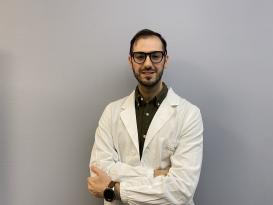
Eisa Naghshineh
Unit: Molecular Pharmacology
Director of Studies: Dr. Marco Folini
Supervisors: Dr. Nadia Zaffaroni, Dr. Paolo Gandellini
Harnessing the Biological effects of G-quadruplex-interacting Small Molecules for Therapeutic Purposes in Mesenchymal Tumors
Guanine-rich DNA sequences can adopt secondary structures called G-quadruplexes (G4), which are frequently found in oncogene promoters and telomeres. Several tumor-associated genes, the promoters of which may form G4, have been catalogued. These observations have provided the rationale to explore G4 targeting as a therapeutic approach. Several small molecules have been characterized as G4-ligands (G4-L); most show a “multiple-target” binding modality, which may be regarded as an advantage for developing multiple-hits, single-agent-based therapeutic approaches. My PhD project aims to 1) characterize at the cellular level the effects of small molecule-mediated stabilization of genomic and telomeric G4 structures in patient-derived soft tissue sarcoma cell lines; 2) identify common or tumor type-specific determinants of the response to G4-L that may represent additional therapeutic targets for the selected malignancies; and 3) explore the therapeutic potential of G4-L-induced DNA damage/genome instability related to the activation of immune gene response pathways in dedifferentiated liposarcoma (DDLPS) tumor cells.
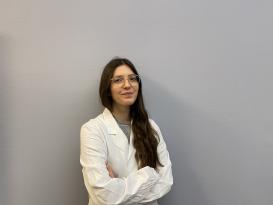
Valeria Pinna
Unit: Molecular Immunology
Director of Studies: Dr. Elena Jachetti
Supervisors: Dr. Daniele Lecis; Dr. Francesco Crea (Open University, Milton Keynes, UK)
Study of tumour- and stromal- related mechanisms contributing to neuroendocrine differentiation of prostate cancer after hormone therapy
Castration resistant prostate cancer (CRPC) can undergo neuroendocrine differentiation (NED) to escape hormone therapy, becoming a more aggressive and uncurable tumour. NED is driven by epigenetic and stroma-derived factors, whose study is essential to define novel therapeutic targets. JMJD6 is an epigenetic regulator that can promote CRPC through the upregulation of the androgen receptor V7 variant. Since its contribution on CRPC progression, in my PhD project I want to investigate if JMJD6 could also impact NED. Moreover, I want to investigate the activity of JMJD6 on fibroblasts, components of the tumour microenvironment that we previously demonstrated can contribute to NED.
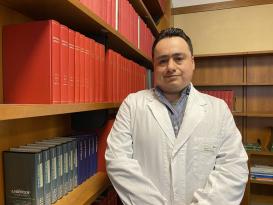
Oscar Pomposo Illescas
Unit: Molecular Epigenomics
Director of studies: Dr. Luca Varinelli
Supervisors: Dr. Paola Perego, Dr. Manuela Gariboldi
The anti-inflammatory drug Ibudilast repurposed for the treatment of colorectal cancer
Chemotherapy is standard for colorectal cancer (CRC) treatment, but is far less effective in patients with peritoneal metastases (PM). This project investigates Ibudilast (IBU), an anti-inflammatory drug that we found can induce the death of tumor-derived organoids (TDO), tridimensional cell cultures that reproduce the original tumor characteristics. As IBU is both an inhibitor of the inflammatory cytokine MIF and the phosphodiesterase (PDE) enzymes, I will first test the effect of multiple PDE inhibitors and compare them to IBU, and perform a transcriptome analysis to determine how it works. Next, I will test IBU’s safety on organoids derived from healthy tissue. I will then test IBU anticancer effects on BRAF-mutated CRC-TDO, because IBU showed to be effective on PM tumors with this mutation; and in Familial Adenomatous Polyposis (FAP) TDO, in which inflammation has a predominant role. Finally, I will test IBU in a model enriched with microenvironment components, such as fibroblasts and extracellular matrix, to better mimic real tumors and improve treatment predictions.
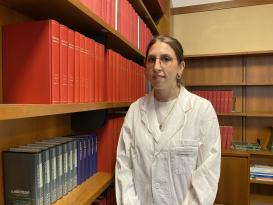
Giuseppina Benedetta Scialpi
Unit: Molecular immunology
Director of studies: Dr. Roberta Sulsenti
Supervisors: Dr. Elena Jachetti, Dr. Barbara Frossi
Alternative functions of mast cells shape castration resistence and neuroendocrine differentation of prostate cancer
Neuroendocrine prostate cancer (NEPC) typically evolves from castration resistant prostate cancer (CRPC) when relapsing to novel hormone therapies. Both these advanced forms of prostate cancer are aggressive and incurable. Crosstalk between cancer cells and the microenvironment is pivotal in CRCP-NEPC transition. Mast cells, a subset of innate immune cells, play a paradoxical role in this context: they promote CRPC yet restrain NEPC. My PhD project aims to investigate the molecular mechanisms governing these opposite functions of mast cells, which appear to be regulated by metabolic reprogramming, with the goal of identifying new therapeutic approaches for CRPC and NEPC.

Cesare Soffientini
Unit: Molecular Pharmacology
Director of studies: Dr. Nadia Zaffaroni
Supervisors: Dr. Marco Folini, Dr. Silvia Stacchiotti
Validation of novel therapeutic targets and determinants of drug response/resistance in epithelioid sarcoma preclinical models
Epithelioid sarcoma (ES) is an ultra-rare and aggressive soft tissue sarcoma characterized by a high tendency for recurrence, metastasis, and poor response to conventional treatments. No standard therapies are available, and prognosis remains poor, especially for patients with metastatic disease. This PhD project focuses on generating and characterizing translatable ES models, such as PDXs and cell lines, to study the disease biology and validate novel therapeutic targets and drug resistance mechanisms. The research aims to identify molecular vulnerabilities and test innovative therapeutic strategies, including drug combinations and epigenetic inhibitors, to expand treatment options for ES patients.
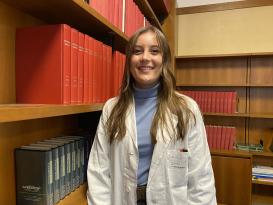
Sofia Tartaro
Unit: Data Science
Director of studies: Dr. Luca Possenti
Supervisors: Dr. Tiziana Rancati, Dr. Marianne Camille Aznar
Micro-physio/pathological systems as preclinical models to predict chemo-radiation outcomes in pancreatic cancer: tumor-on-chip platforms
Microphysiological systems, particularly microfluidic chip technologies, consist of interconnected channels with micrometer-scale dimensions. By combining biomedical engineering, biological, and computational modelling expertise, these platforms enable the in vitro recapitulation of selected features of the tumor microenvironment within a controlled three-dimensional setting. In this PhD project, I aim to develop a tumor-on-a-chip model that mimics the pancreatic ductal adenocarcinoma (PDAC) microenvironment to study the efficacy of chemo and radiotherapy. PDAC is often characterised by a desmoplastic, dense, and fibrotic stroma, a hallmark that contributes to the tumor’s resistance to conventional treatments. The proposed system will integrate key mechanical and biochemical components associated with PDAC therapy resistance, including stromal cells, the stroma’s mechanical properties, and a tissue-specific microvascular network, enabling the investigation of how these factors influence treatment responses. Ultimately, experimental studies will be complemented by computational models to simulate cellular responses to therapies. Together, these models offer valuable platforms for enhancing the prediction of treatment outcomes and accelerating the development of preclinical models.
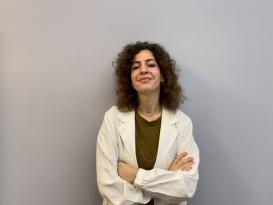
Anna Zanichelli
Unit: Molecular immunology
Director of studies: Dr. Sabina Sangaletti
Supervisors: Dr. Orazio Fortunato, Dr. Paolo Verderio
Exploiting the role of neutrophils extracellular traps (NETs) and associated ZEB1 molecule in the development of immune suppressive niches in lung cancer
Despite significant progress in cancer therapies, lung cancer (LC) remains challenging, with low survival rates largely due to late diagnosis or relapses from residual cancer cells. Therefore, early detection of primary tumors or relapse could greatly improve survival outcomes for patients. In the tumor context, immune profiles are often modulated and altered to support tumor initiation, progression, and metastasis. Cancer involves the constant signaling between the tumor and the bone marrow, creating a tumor microenvironment rich in myeloid cells, including neutrophils, monocytes, and immature cell populations, as a result of emergency hematopoiesis. Thus, studying these circulating cells may reveal valuable signals for diagnosing LC. This project mainly aims to validate early myeloid-derived suppressor cells (eMDSCs) and neutrophils as predictive biomarkers for lung cancer onset and relapse. Additionally, it explores the role of the ZEB1 transcription factor in immune suppression, focusing on its collocation along the neutrophil extracellular traps (NETs) through studies in both human and mice models. Putative mediators in the signaling between the tumor and the bone marrow are also investigated.
Ultimo aggiornamento: 27/01/2026



